An army of tradies have put up their hands to help out with the skills shortage nationwide
Thousands of tradies nationwide have raised their hands to help rebuild bushfire affected communities for free amid a skills shortage across the country. Childcare centres have done their bit with preparing the smallest Aussies for evacuation too.
Bushfire Support
Don't miss out on the headlines from Bushfire Support. Followed categories will be added to My News.
- World mourns US firefighters who died in crash
- Musicians rally to contribute to bushfire relief efforts
A drastic skills shortage across the country could slow down the fire recovery process as the country struggles with construction skill shortages in the face of unprecedented destruction.
To help fill the gap, an army of 6000 tradies have put their hands up to work for free.
Australia’s horror fire season has seen more than 5900 buildings destroyed including more than 2800 homes.
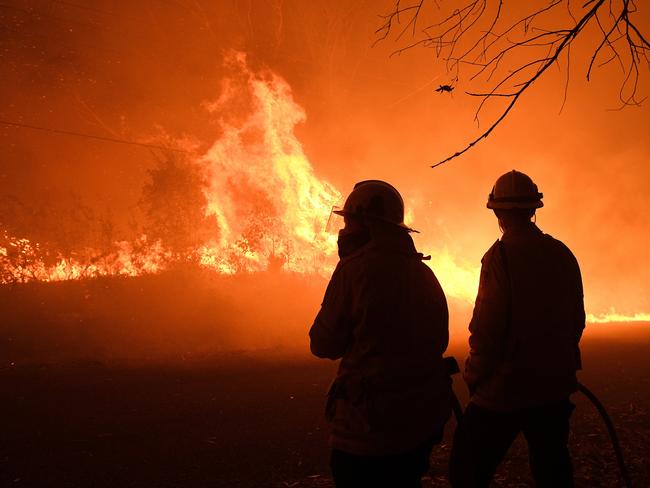
New South Wales, where more than 1500 homes have been lost, has a skill shortage in key construction trades, bricklayers, carpenters, painters, plasterers, plumbers and electricians, according to figures from the Department of Employment, Skills, Small and Family Businesses.
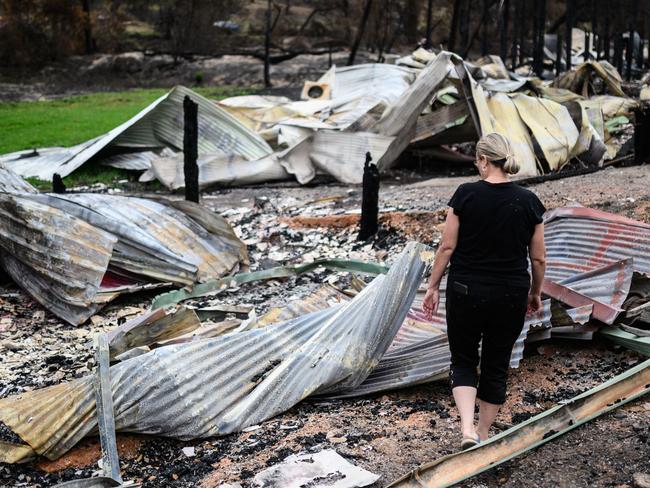
Victoria, where hundreds of homes were lost, has shortages in all trades except painting and South Australia, which lost 89 homes on Kangaroo Island alone, has an abundance of plumbers, but low numbers of all other tradespeople.
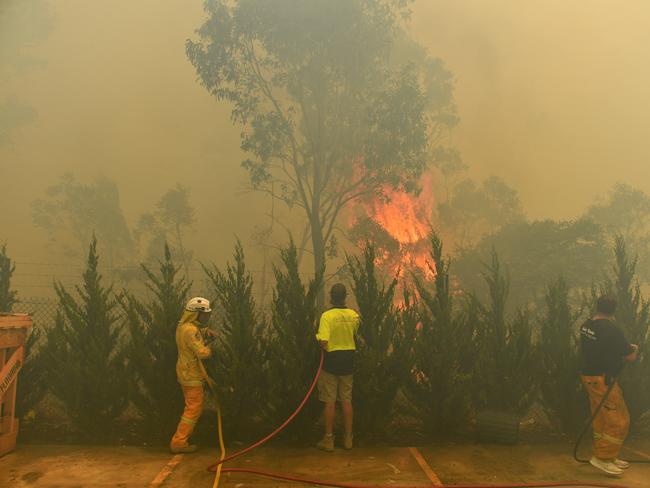
The only trade shortages in Queensland, where at least 20 homes were lost, are in plumbing and bricklaying.
Figures from the Insurance Council of Australia estimate a loss bill of $1.65bn with 20,000 claims made since November 8 last year.
Volunteers have so far been at the forefront of the rebuilding effort, but with the process expected to take years, keeping the momentum going and making the most of the tradies at hand is an ongoing learning process.
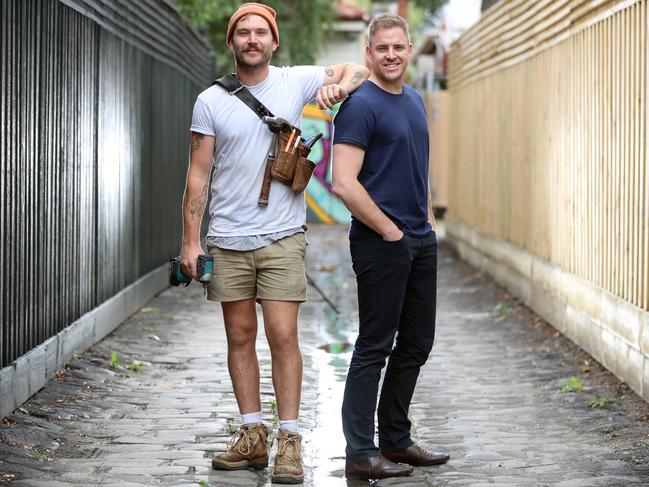
Melbourne carpenter Piers Smart, 31, started the Tradies for Fire Affected Communities (TFFAC) Facebook page on January 2 – which already has more than 13,000 followers – to link trades people with those in need.
Its website has already helped create an extensive database and a new site will be live within weeks to streamline the process.
“We’re really trying to make contacts with the government,” Mr Smart said.
“We have a database of 6,000 tradies – we have their email, we know what trades they do, we know what tickets they have, how far they’re willing to travel.
MORE NEWS
Trump brands trial ‘corrupt’ upon US return
$10 million SBW might not even play
Dutton rejects Cabinet reshuffle talk on sports rorts row
“We’re basically crying out for governments and charity bodies, ‘how can this database help you?’.”
Mr Smart said he never anticipated the group to take off like it did and said he was working “more than a full time job on top of a full time job” along with mates Jackson Taylor and Kyle Hurley to maximise its effectiveness.
“We’ve started to have some really great meetings with big trade suppliers, which is probably the next big step,” he said.
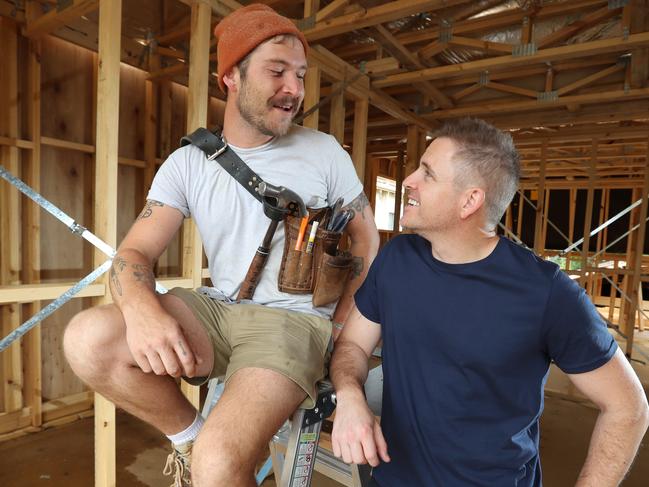
Mornington Peninsula carpenter Robert Johnstone, 32, has been out to fire affected Victorian regions three times and is trying to balance his job and volunteer work as well as helping co-ordinate jobs on the TFFAC page.
Along with his “right-hand man” Nathan Alison, the pair have helped repair fences and clear properties and sheds with a small army of other volunteers.
Mr Johnstone – who has helped raise more than $20,000 for the effort – said he didn’t think trade shortages would impact the efforts, but was concerned volunteering could eventually slow down.
“At the moment I’m trying to spend two weekends away, one weekend back,” he said.
“I’ve got no issue with continuing my battle, but what about everyone else?”
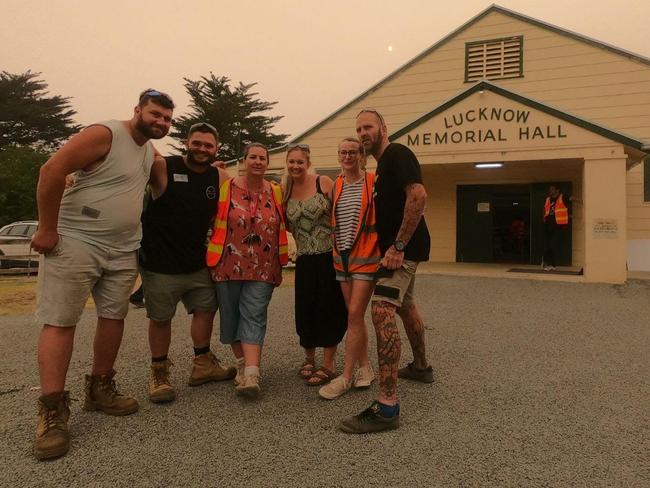
Master Builders Australia CEO Denita Wawn acknowledged the shortages and told News Corp she wanted to see local tradespeople prioritised for repair and rebuilding works, but it had to be balanced with ensuring a quick turnaround.
“There will certainly be capacity constraints and victims of the fires should not be made to wait excessively for their homes to be rebuilt,” she said.
“Bringing tradespeople coming from neighbouring towns, regions and further afield to meet immediate capacity constraints will provide desperately needed stimulus in bush fire devastated communities.”
Nigel Davies, Assistance Secretary CFMEU National Construction Division said: “local builders must be supported to do the work wherever possible, thereby ensuring the reconstruction work is a genuine boost to local families and economies.”
Housing Industry Association chief executive of industry policy Kristin Brookfield pointed out homeowners from the 2018 Tathra fires in NSW were still homeless and warned some homes may not be able to be rebuilt.
“There is the potential some properties will be at such high risk that the better option is somebody does not live there,” she said.
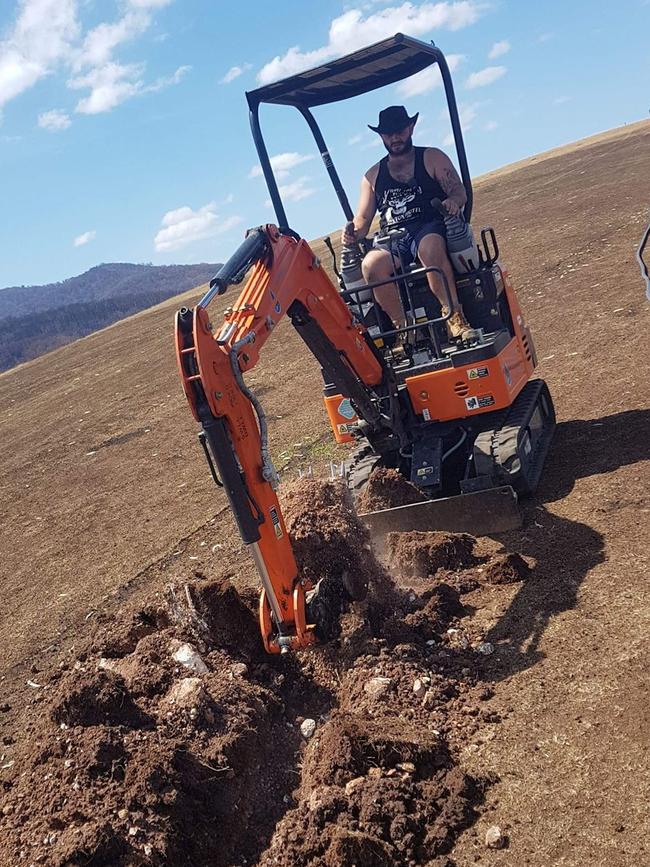
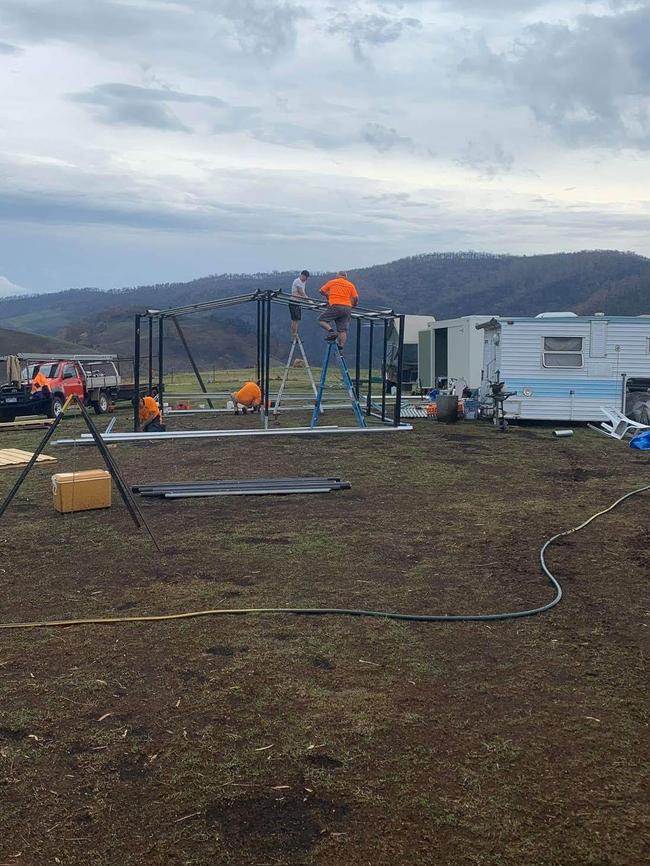
Labor MP Tanya Plibersek said it was “disappointing that 140,000 apprentices and trainees have been lost under this Federal Government”.
“But as we work to help families rebuild after such devastation, let’s make sure we get Aussie tradies and apprentices out on the ground in these communities, where they are desperately needed.”
A spokeswoman for the Minister for Employment, Skills, Small and Family Business, Michaelia Cash, said the Coalition Government was “committed to ensuring Australians have the right skills for the workforce of today and the future”.
“Since the Government was re-elected we have been working towards our commitment of training an additional 80,000 apprentices and trainees over the next five years through our incentive programs,” the spokeswoman said.
For the information you need start at www.moneysmart.gov.au
For insurance issues contact your insurer or call 1800 734 621
HOW CHILDCARE CENTRES PREPARED THE LITTLEST AUSSIES FOR FIRES
When the call came to evacuate the Bargo childcare centre even the littlest Australians knew exactly what to do. They had been practising the fire drill for weeks – even making sure they kept their shoes on at naptime.
Now the children at Community Kids Bargo, on New South Wales’s south coast, who faced the same firestorm that wiped out neighbouring town Balmoral, are part of the story of rebuilding.

Childcare experts say the early childhood sector will play a crucial role going forward but some are calling for better communication around closures and evacuations.
“We have done some initial scanning to work out level of impact and it is quite extensive,” Judy Kynaston, General Manager of Early Childhood Australia (ECA), the country’s main industry body, said
ECA are currently bringing together resources to go out to 1800 centres in fire affected regions and Emma Whitehead, Centre Director from G8’s Community Kids Bargo, said they will be working with the children doing targeted play activities.
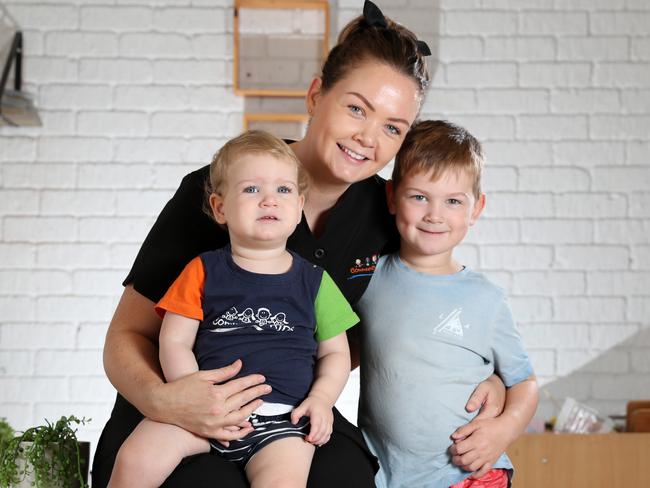
She said extra practices of fire drills in the weeks before the fires meant on the day, most of the children didn’t realise it was the real thing.
“The kids actually seemed to enjoy it like an excursion because we had practised so many times it wasn’t a shock to them,” she said.
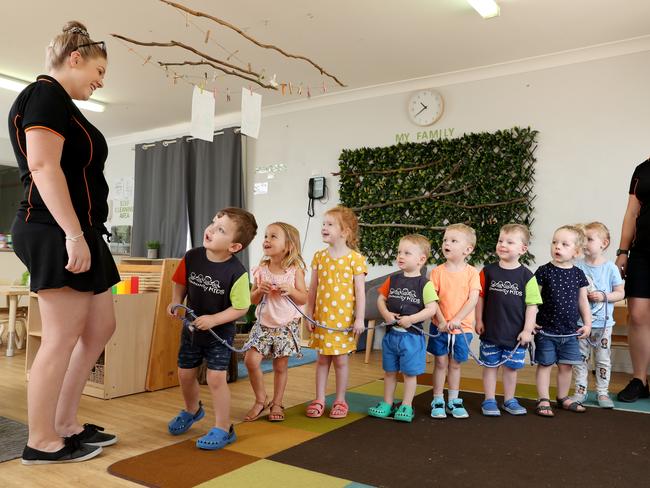
“I had to go into the kitchen and take a big breath and then did our roll call, headcount and arranged all the children to go on the bus,” she said.
“When it hits Balmoral it is only a matter of minutes before it gets to Bargo so we were prepping all morning.”
Ms Whitehead, who has two children of her own at the centre, said it was hard not knowing where they were while she managed the evacuation – but she knew they were in good hands.
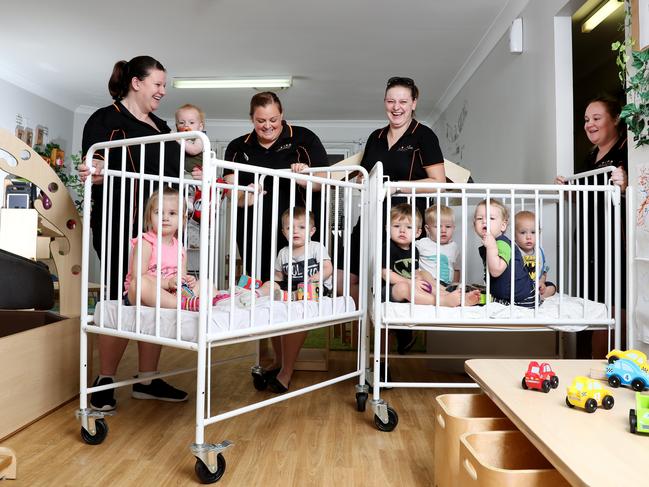
“I am so glad we had it all in place, we have all cried about it a few times.”
Childcare insiders said more broadly that the industry was in the dark in the lead up to the fires and relied on the local RFS for information.
They said the first official communication that came through was by the Victorian state government when Victoria had been declared a state of disaster.
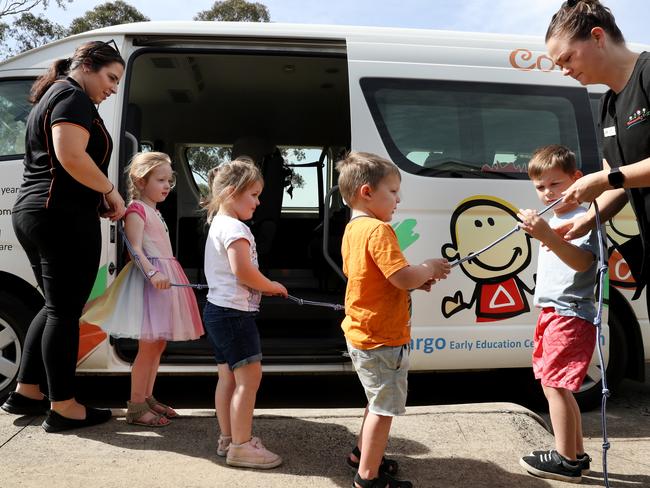
Early Learning and Care Council of Australia CEO Elizabeth Death said a nationally consistent approach to bushfire emergencies was needed.
“The current crisis highlighted that information flow to services facing critical decisions about closures and evacuations was often poor and uncoordinated,” she said.
“Improvement to ensuring services have access to real time emergency service alerts, centralised information and expert advice is critical to inform decisions for the safety of all children and staff.”
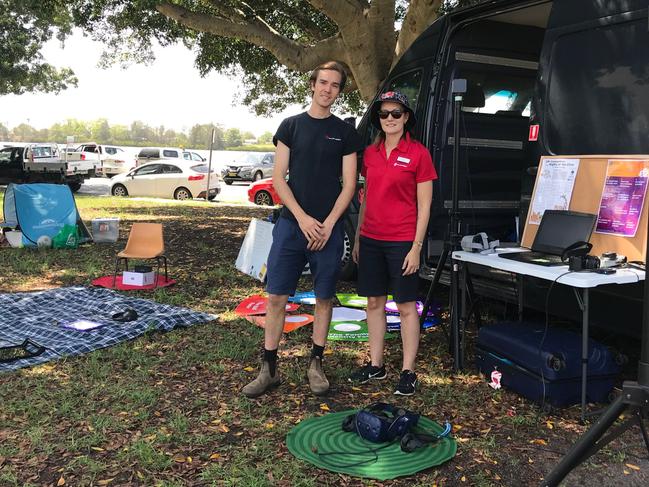
CEO of Goodstart Early Learning Julia Davison said they were looking forward to working with the Federal Government on more detailed guidance.
“One of the other issues this disastrous fire season has highlighted is the need for faster fee relief for families during emergencies. The current system is too slow and too demanding on families at a time when they need all possible support,” she said.
“One solution the sector is exploring with the government is that when a disaster is declared, all early learning centres can provide up to 13 weeks of access at no cost to affected families immediately.”
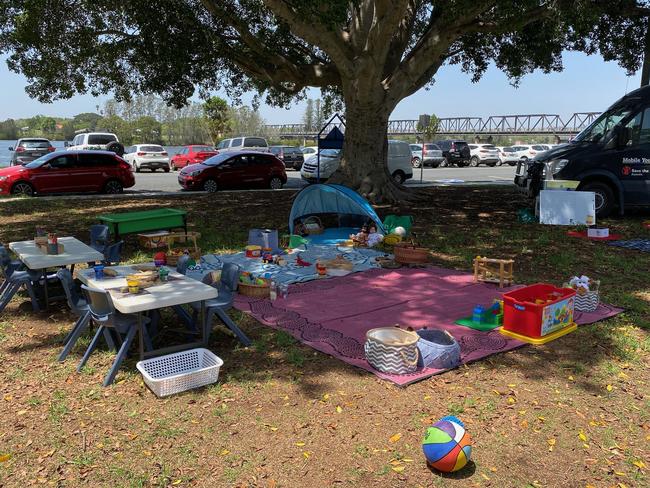
A department education spokesman said: “lessons learnt from these unprecedented fires, will be discussed at the next Education Ministerial Council officials meeting” and Minister for Education Dan Tehan said an additional $8 million has been provided for on the ground support for early childhood services and schools impacted.
Goodstart and G8 are offering all active volunteer firefighters free care for children and G8 Education are also running a Bushfire Relief package which matches dollar for dollar donations.
“As well as raising much-needed funds, some centres have been acting as collection points for
necessary items such as food and clothing, with children even donating their favourite toys to those who have lost it all,” Managing Director Gary Carroll said.
Originally published as An army of tradies have put up their hands to help out with the skills shortage nationwide
